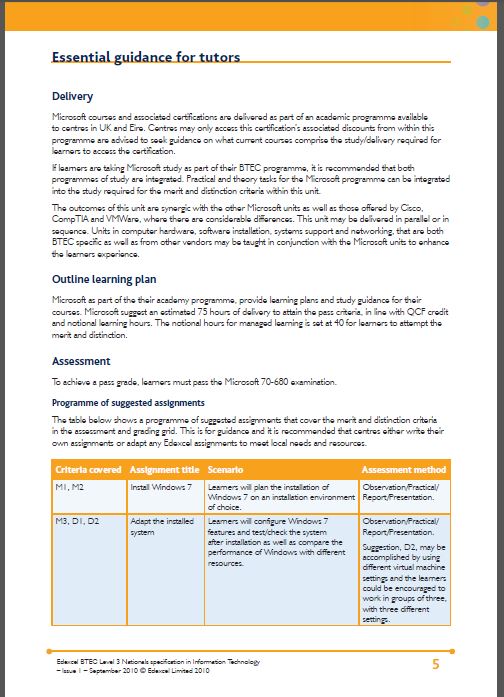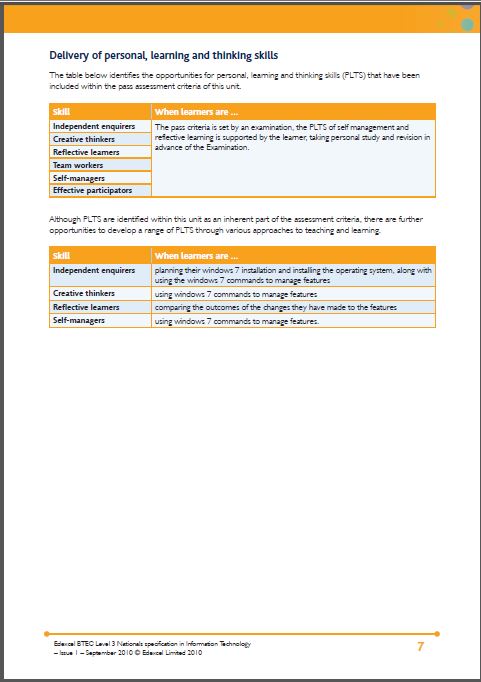Building Vendor Certifications into Educational Programmes
A while back a posting on LinkedIn got me thinking of the disconnect between industry and academia. In this case the particular poster was stating how vendor certifications are not supported by further education colleges. It wasn’t clear if the poster was talking about the capability of delivery of the content or for vendor certifications to fit as part of a cohesive programme.
There is an argument that basing a qualification achievement on whether a student can pass a vendor exam is not a good idea. Especially since vendor exams are fluid in nature. For example, unmarked questions, varying question numbers, and statements such as “includes but not limited to” in the objective domains (syllabus) for the exam does not provide the educator the boundaries in which they have traditionally operated. However, such boundaries are responsible for widening the gap between academia and industry. It would be nice to have problems with defined constraints within the workplace, however, this never happens. Hence building vendor certifications into an academic qualification could serve as a “wake up call” to students.
In terms of getting the teaching staff suitably qualified to deliver the vendor qualification, well that just depends on background and personal/professional development goals. At the moment there is such a plethora of information available for free to support teachers in their goal to become certified and get the depth of knowledge required to teach a vendor certification course. If an institution decides to go with a vendor qualification then there are fantastic resources available via the Microsoft IT Academy Programme, the CompTIA Academic Partner Programme and the Cisco Academy programme.
So, the vendors are supporting their qualifications within academic institutions. Additionally, the awarding bodies are also supporting the integration of certifications by allowing them as optional units in a range of qualifications from Levels 1 to 5 including:
- City & Guilds Level 1 Certificate in ICT Professional Competence
- Pearson BTEC Level 2 Certificate in IT
- OCR Level 3 Extended Diploma in ICT Systems and Principles for Professionals
- City & Guilds Level 4 Diploma For ICT Professionals
- Pearson BTEC Level 5 HND Diploma in Computing and Systems Development
It’s well worth investigating how the awarding bodies have integrated the certifications into their qualifications. Some awarding bodies are happy to accept a pass on the vendor exams to record a pass for the unit; whereas others are allowing the student to demonstrate application of the knowledge by giving the opportunity to gain a merit and distinction.
Let’s walkthrough the unit specification for the 70-680 Windows 7, configuring unit from Edexcel. You can download it from: http://www.edexcel.com/migrationdocuments/BTEC%20Nationals%20from%202010/Unit-124-Microsoft-Windows7-Configuring-70-680.pdf
The first page of the document provides background of the unit and covers similar information as you can find on the overview section of the objective domains: http://www.microsoft.com/learning/en/us/exam.aspx?id=70-680
The most important point to note is that the 70-680 is a Level 2 unit and requires 50 Guided Learning Hours which exceeds both the amount of time to deliver the MOC (3 days) and the MOAC (30 hours). Hence already it is established that a greater amount of learning is required for students to successfully complete this unit. Also it must be noted that the unit only provides 6 credits – this may be low in terms of other units which are cheaper to deliver and less strenuous. However, the actual value of this unit to potential employers may supersede the entire qualification.
The second page has the learning outcomes which is the same as the top level of “skills being measured”. The important point to note here is that “Configuring Backup and Recovery Options” element is missing from the Edexcel document. This is most likely to be an oversight and happens occasionally with awarding body documents so it is vital that these are double-checked against the vendor’s documentation.
Page 3 looks at the unit content required for the Merit and Distinction criteria. The pass criteria would be all the content outlined in the objective domains.
The Assessment and Grading criteria page outlines the tasks required to achieve each grading criteria. Looking at the merit and distinction criteria, these look like fantastic assignments to complete prior to taking the certification exam. So as part of the delivery of this unit it would be advantageous to carry these assignments first to identify any knowledge gaps.
The fifth page provides advice on how to deliver this unit, although it doesn’t provide much information. As this document uses a pro-forma for all the Edexcel units, it has to follow this format. More delivery guidance is given with the MOC and MOAC materials.
The essential resources section provides a good starter for centres new to deliver vendor certifications. Interestingly, it does acknowledge the use of virtual machines which has now become the industry standard for delivering certification courses.
Educators would be glad to see the content for page7 as it provides guidance of how Personal Learning and Thinking Skills (PLTS) can be built into the delivery and assessment of the unit.
The final page would also be welcomed by educators as this addresses how Functional Skills are linked to the unit. The document links to ICT and English, but since the students need to know how to subnet as part of the course, Maths can also be incorporated.
Unfortunately, not all certifications exams available on the Register of Regulated Qualifications (http://register.ofqual.gov.uk/) have such comprehensive unit specifications, however, this could be used as a template for integrating any certification into a programme of delivery.
So, if you’re an academic delivering an IT programme and haven’t integrated vendor certifications into your programme, now is the time. The global marketplace is becoming increasingly competitive and such qualifications will help your students to become more valuable to employers.







